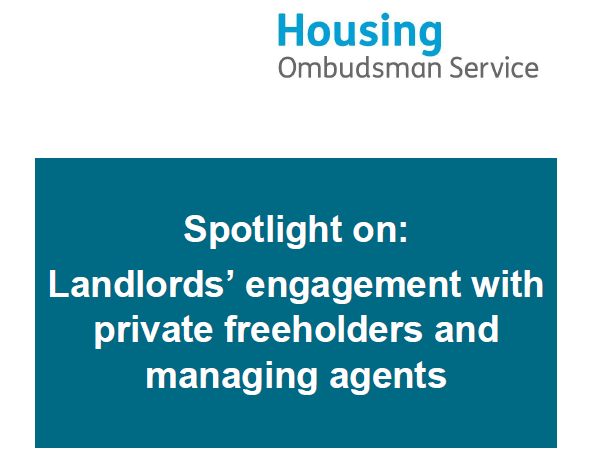Ombudsman calls for stronger regulation of managing agents
22 March 2022
Ombudsman calls for stronger regulation of managing agents after unfairness to social landlord residents investigated

A culture clash between a regulated and largely unregulated sector creates challenges for the social housing sector’s engagement with managing agents, says the Housing Ombudsman in its latest report into systemic issues. Residents then experience the unfairness of being stuck in the middle when they try to get issues resolved.
The Ombudsman’s Spotlight Report examines learning from cases involving a relationship between social landlords and managing agents appointed by private freeholders. Overall, it finds that the increased complexity of these arrangements seems to correlate with an increase in confusion, delay and unfairness. This contrasts with the Ombudsman’s efforts to simplify complaints processes and improve outcomes.
The Ombudsman examined 62 cases investigated over one year where the landlord had to engage managing agents and private freeholders to resolve issues. It found a high level of maladministration at 64.5% in those cases, about a third higher than the average for casework in the same period. Cases included in the report highlight the real-life experiences of residents, including the repeated loss of hot water during winter, leaking roofs and unexplained service charges, and demonstrate the immense frustration felt by residents.
The report sets out what the Ombudsman has found to help raise awareness of the challenges faced by landlords and residents. It recognises that these can be challenging issues for landlords and provides important practical lessons for them to handle things better, based on the insight from the complaints investigated. It makes 14 recommendations and proposes some questions for landlords to use as a basis for self-assessment.
Richard Blakeway, Housing Ombudsman, said: “Our report shows that the relationship between social landlords and managing agents is often strained and, at worst, dysfunctional. Landlords often feel a tension between their social objectives and the business objectives of some managing agents and some of the freeholders that appoint them. This tension can result in deep unfairness for residents.
“Without a standalone regulator driving consistency and improvement, the managing agent sector presents significant challenges and risks to social landlords. As well as raising awareness of these challenges, we also want this report to support landlords to assess how well their own approach is working, identify areas to make improvements, and encourage greater collaboration to overcome some of these challenges.
“Through our casework we have noticed an increasingly complex landscape with many and varied arrangements. There is often confusion, not just for the resident, but also the landlord and third-party managing agent and/or freeholder as to responsibilities.
“Central to this is accountability. Residents should be able to hold the professionals that are responsible for the quality, safety and management of their homes to account for ensuring that defects and repairs are resolved and that their complaints are handled in a timely manner. In turn, landlords should also be able to hold third party freeholders and managing agents to account in relation to discharging their responsibilities.
“I would encourage landlords to consider the learning provided by this report and set out how they may do things differently using our self-assessment questions as the basis.”
The recommendations made in the report include:
- a standalone regulator driving consistency and improvement, given the managing agent sector presents significant challenges and risks to social landlords.
- sector collaboration to increase their collective influence on rogue or poor performing managing agents.
- shared understanding of the challenges and risks associated with new homes between development and operational teams.
- reviewing agreements with managing agents to clarify roles and responsibilities and consistent approach to escalating issues.
- reviewing complaints and service and repair requests in buildings managed by third parties to ensure they are effective.
Spotlight on landlords’ engagement with private freeholder and managing agents – where regulated and unregulated sectors meet:
